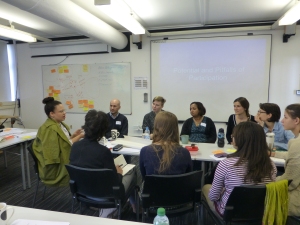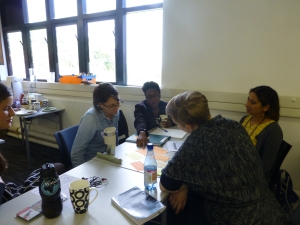‘Participation’ has become ubiquitous in debates around development policy and practice, resulting in many scholars and practitioners querying its merits. In a day-long workshop held at Royal Holloway, participants reflected on the potential of ‘participation’ to move beyond tokenism or tyranny, to be part of processes of social transformation and greater social justice.
The workshop was part of a programme of exchange between the Department of Geography and Erasmus partner University of Bonn, with Prof Sabine Tröger as a visiting staff member. It was co-hosted by the RHUL ICT4D Centre and the Politics, Development and Sustainability Group and discussed participatory approaches in community and international development work. Participants included researchers, practitioners and students.
 There were four presentations in the morning, followed by discussion: Sabine Tröger critically examined the power relations in participatory processes with Ethiopian pastoralists; Jay Mistry from the EU Cobra Project discussed the challenges of doing participatory film work with indigenous groups in the Amazon; Naomi Shoba reflected on the participatory work with young people that Ovalhouse Theatre do, specifically on engaging with emotion in participatory theatre practice; Dorothea Kleine from the ESRC Food Futures 2.0 project reflected on the different roles of facilitator and expert in participatory work on sustainable consumption.
There were four presentations in the morning, followed by discussion: Sabine Tröger critically examined the power relations in participatory processes with Ethiopian pastoralists; Jay Mistry from the EU Cobra Project discussed the challenges of doing participatory film work with indigenous groups in the Amazon; Naomi Shoba reflected on the participatory work with young people that Ovalhouse Theatre do, specifically on engaging with emotion in participatory theatre practice; Dorothea Kleine from the ESRC Food Futures 2.0 project reflected on the different roles of facilitator and expert in participatory work on sustainable consumption.
The afternoon was then spent in un-conference style themed small group discussion. A number of key themes emerged:
Participatory approaches are useful in ensuring that research is more relevant to the local community and supports positive social change. However, there are different perceptions of what participation is, e.g. some funders/development agencies consider community consultation enough, while others seek community decision-making. Participatory methods are not “neutral” activities but one step in a change process and there is no such thing as a “neutral researcher”.
‘Doing’ participatory research/ practice is time consuming for all and requires significant reflexivity, particularly in relation to how pre-existing forms of power can be reinforced, often unintentionally. This can relate to who participates and who is excluded, but also how different tools, instruments and approaches influence participatory processes and outcomes. Power is often not only held by the powerful, but also accepted by those subject to that power.
In terms of facilitation, there are benefits and downsides to being perceived as an “outsider” to the community. It is important to consider the role of the researcher as facilitator and how this chimes or conflicts with local perspectives on change. What “language” should the facilitator of participation processes use?
 On issues like gender sensitivity or other forms of divisions that might exist within communities, it is better to be informed about situations that are specific to the community you’re handling and devise ways of working around existing conditions and not against them (unless this is a conscious decision). For example, divide men and women/ adults and children into different groups so that each group can express their views with a lot more ease. Working in a team, and possibly mixed teams with male and female researchers, may help access the different perspectives of men and women more easily.
On issues like gender sensitivity or other forms of divisions that might exist within communities, it is better to be informed about situations that are specific to the community you’re handling and devise ways of working around existing conditions and not against them (unless this is a conscious decision). For example, divide men and women/ adults and children into different groups so that each group can express their views with a lot more ease. Working in a team, and possibly mixed teams with male and female researchers, may help access the different perspectives of men and women more easily.
Working in a team can also help less experienced researchers/practitioners learn from more experienced researchers/practitioners and can support motivation throughout a long research process. However, many communities are familiar with participatory methods which can result in participation fatigue or apathy. The researcher/practitioner using participatory approaches should consider project sustainability and what will be left behind – many communities are apathetic about supposed participatory exercises because they have not resulted in any positive outcomes in the past.
Finally, and very importantly, using participatory approaches in research and practice is an ongoing learning process and sharing experiences and reflecting on them is a vital element of building our own and others’ capacity.
Participants commented:
It was useful to see real life examples and to be able to interact with researchers who admitted to not having all the answers. I enjoyed seeing how the approaches to participation are still evolving and that all researchers, including me, can too contribute our lessons to the overall school of thought. The workshop challenged ideals that I wasn’t entirely aware I held.
(MSc Practising Sustainable Development/ICT4D Masters student Chisenga Muyoga from Zambia)
I really enjoyed hearing about the use of participatory methods in various research projects, learning about the challenges the researchers faced and how they overcame these issues to conduct their research. After the presentations, we had group discussions on topics such as gender issues in participatory research and the role of the facilitator, which allowed us to ask more in-depth questions about participatory research experience. We had a really good discussion about gender (in)equality in research, comparing the gender issues faced by researchers in different parts of the world. Attending this workshop was really insightful and I feel confident about using participatory research methods for my dissertation.
(MSc Sustainability & Management student Elisabeth Kingdom from the UK)
Contributors to this blogpost: Dorothea Kleine, Benjamin Mroczkowski, Chizitere Ojiaka, Gemma Pearson, Sabine Tröger and Ku-Wai Wang.

